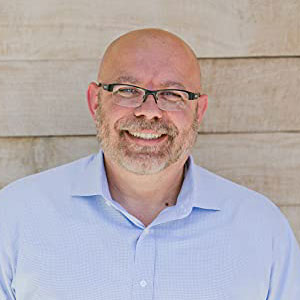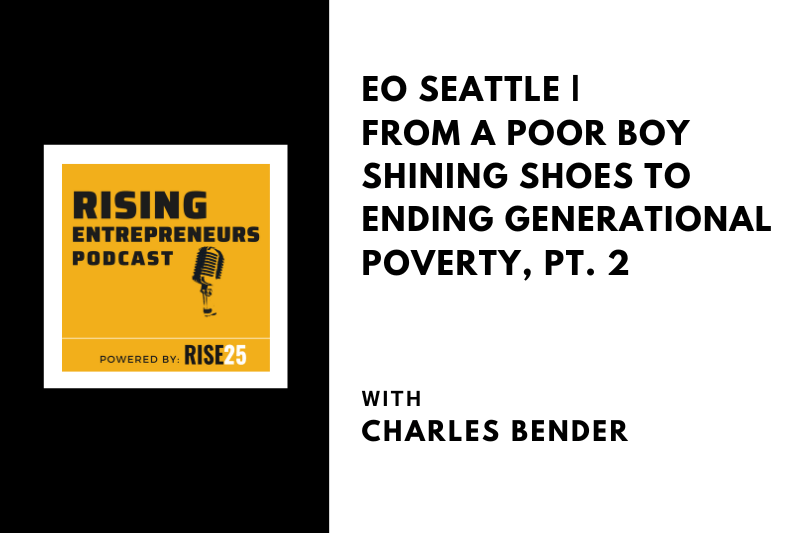 Longtime entrepreneur Charles (Chuck) Bender is the CEO of Attentus Technologies, a leading IT service provider in Bellevue and Seattle. He has a strong background in managed services and the internet industry, with expertise in business planning, operations management, and sales.
Longtime entrepreneur Charles (Chuck) Bender is the CEO of Attentus Technologies, a leading IT service provider in Bellevue and Seattle. He has a strong background in managed services and the internet industry, with expertise in business planning, operations management, and sales.
Chuck is a dedicated member of the Entrepreneurs’ Organization (EO) and currently serves as the regional chair for the US West region. In addition to his professional pursuits, Chuck is committed to ending generational poverty and is a follower of the philosophy of Stoicism.
Here’s a glimpse of what you’ll learn:
- Chuck Bender’s pivot from the dating service to IT services
- What motivated Chuck to transition into the internet business?
- Chuck’s passion for eliminating generational poverty
- How Chuck broke the generational poverty curse
- Why changing your mindset changes your outlook on life
- Chuck’s approach to raising competent children
- People who’ve had a massive influence on Chuck’s life
In this episode…
Overcoming poverty is an admirable accomplishment, but the battle doesn’t end there for those with familial responsibilities. Though survivors of an impoverished life may want to spoil their children with the lavish lifestyle they never had, Chuck Bender knew that wasn’t the path he wanted to take.
Chuck explains he knew ending the curse of generational poverty was his responsibility. He surrounded himself with successful hard workers who taught him it was normal to dream big. Once he became a father, he didn’t want his children to grow up thinking wealth was unattainable. Instead, Chuck opted to raise his children to become competent adults. How did he do it?
Tune into this episode of the Rising Entrepreneurs Podcast with host John Corcoran as he welcomes the CEO of Attentus Technologies, Charles (Chuck) Bender. The two continue their discussion about overcoming generational poverty as Chuck explains changing your mindset to achieve greatness, living in gratitude, and raising his kids to appreciate money through honest work. Plus, Chuck talks about his entrepreneurial journey from the matchmaking space to founding his IT and internet businesses.
Resources mentioned in this episode
- Charles (Chuck) Bender on LinkedIn
- Attentus Technologies
- Skynet Broadband
- Entrepreneurs’ Organization (EO)
- EO Seattle
- EO Accelerator
- John Corcoran on LinkedIn
- Rise25
- How to Win Friends & Influence People by Dale Carnegie
Special mention(s):
Sponsor for this episode…
At Rise25, we’re committed to helping you connect with your Dream 100 referral partners, clients, and strategic partners through our done-for-you podcast solution.
We’re a professional podcast production agency that makes creating a podcast effortless. Since 2009, our proven system has helped thousands of B2B businesses build strong relationships with referral partners, clients, and audiences without doing the hard work.
What do you need to start a podcast?
When you use our proven system, all you need is an idea and a voice. We handle the strategy, production, and distribution – you just need to show up and talk.
The Rise25 podcasting solution is designed to help you build a profitable podcast. This requires a specific strategy, and we’ve got that down pat. We focus on making sure you have a direct path to ROI, which is the most important component. Plus, our podcast production company takes any heavy lifting of production and distribution off your plate.
We make distribution easy.
We’ll distribute each episode across more than 11 unique channels, including iTunes, Spotify, and Google Podcasts. We’ll also create copy for each episode and promote your show across social media.
Co-founders Dr. Jeremy Weisz and John Corcoran credit podcasting as being the best thing they have ever done for their businesses. Podcasting connected them with the founders/CEOs of P90x, Atari, Einstein Bagels, Mattel, Rx Bars, YPO, EO, Lending Tree, FreshBooks, and many more.
The relationships you form through podcasting run deep. Jeremy and John became business partners through podcasting. They have even gone on family vacations and attended weddings of guests who have been on the podcast.
Podcast production has a lot of moving parts and is a big commitment on our end; we only want to work with people who are committed to their business and to cultivating amazing relationships.
Are you considering launching a podcast to acquire partnerships, clients, and referrals? Would you like to work with a podcast agency that wants you to win?
Contact us now at support@rise25.comor book a call at rise25.com/bookcall.
Rise25 Co-founders, Dr. Jeremy Weisz and John Corcoran, have been podcasting and advising about podcasting since 2008.
Episode Transcript
Intro 0:02
Welcome to the Rising Entrepreneurs Podcast where we feature top founders and entrepreneurs and their journey. Now let’s get started with the show.
John Corcoran 0:13
Alright, welcome everyone, John Corcoran here. And the host of this show, and this is part two. I very, very rarely do a two parter. But I really enjoyed the conversation last time with my guest. And so I twisted his arm and got him to agree to stick around for a second episode. And we really didn’t get into the second half of his journey. So I’m glad that we’re able to do that. His name is Charles Bender, he’s the CEO of Attentus Technologies. He also for those of you listening to this show, you know that I am active in Entrepreneurs Organization. And he is the Regional Chair for the US West of Entrepreneurs Organization, which is kind of like El Jefe, he’s the big boss for the Western United States, a lot of different chapters, everyone salutes to him when he comes into the room. That’s kind of how it works. And so we’re going to talk a little bit about his involvement in that wonderful organization. And of course, if you haven’t listened to the show before, go check out our archives, lots of great episodes in there, lots of EO members from Vern Harnish, to Warren Ruston and, and lots of different guests like that, that you can go to checkout. And this episode, of course, brought to you by Rise25, my company which helps b2b businesses to get clients referrals and strategic partnerships we’ve done via podcasts and content marketing, and you can visit our website at Rise25.com. To learn more about it. Alright, Charles, last time, we heard some great stories about growing up in Prescott, Arizona, you know, shining shoes and making money. And what a poor kid learned about making money from a young age was one of the key pivot points that we didn’t get to that I was super curious about is how someone’s in the dating space, and then gets into IT services, because that does not seem like a logical linear path at all. But maybe it makes sense in retrospect. So how do we go from there to there,
Chuck Bender 1:54
I will start. So it’s not directly from dating to IT services. So what happened was is I moved to the country, I moved out and in the farm world, in 2002, and I had built the CRM system to run my dating service franchises. And it was dashboarding. And all this stuff was pretty early in that stuff. But I needed the internet in order for it to work and there was no high speed internet available at my house. And what I loved and we’re talking dial up days, dial up days, right? I mean, well, there was there was broadband in the cities, but not yet in the country. Right. And, and I was used to downloading on Napster man, I was like, you know, that was like killing me. But what really happened was is I got out here and when I was searching for the house, there was nothing that was the normal traditional, there’s no cable, there’s no DSL, there was none of those types of things that were available. And a couple of guys had started this wireless ISP. And they told me before I bought the house that oh, yeah, we can get you high speed internet. So I bought the house moved in went to order my high speed internet, and suddenly they couldn’t, right. So I was like, really, you know, just probably made my biggest single investment in a property ever because it’s a couple acres, you know, nice acid. And it functionally means I can’t I still have to go to an office, that’s not going to work for me. So what I did, what I ended up doing is I ended up going and putting in what was called a T one, which is a one and a half megabit by one and a half megabit line for internet over copper. It was used to be really common back in the old days. And it was super expensive was like 900 or $1,000 a month, right? And I remember thinking to myself, Man, I need it badly. I can afford it. But man, I’m cheap. I don’t like to pay $900 a month. So my neighbors had come over and these guys had this wireless business. They’re like, listen, we might be able to help offset the cost of the $900 If you let us put an antenna on your house. And so I brought my neighbors over and showed him what high speed mentor internet was like. And they were like, Oh, I have to have some of that. So I was like, Okay, well I’ve got eight neighbors on my on my off my house 900 divided by eight. Maybe I can get my whole T one paid for by neighbors really? Yeah, look at where it’s done. So we did that. And it was really early days of wireless technology. And frankly, the what happened was is these two guys didn’t have any money. They had an idea. They had some skills. One of them was super bright. Actually. He’s a principal at Microsoft today. Super bright guy, his his brother younger brother is my business partner in my IT business today. But, you know, he additionally was my partner when I bought into the broadband business. I bought into it because I had money and lots of hubris, right? I frankly thought because I had a successful business that I understood business And, and I was young and thought I was invincible. So
John Corcoran 5:04
it was an existing business that was providing broadband in the countryside is that what it did? Trying
Chuck Bender 5:10
to it was when I say existing business, they had 14 customers, okay? It wasn’t a business, okay? It was like a hobby that they were trying to turn into a business. And neither one of them really had the funding, they didn’t know how to build a business model. They didn’t know what it would cost to actually make it a profitable venture.
[Continue to Page 2]








